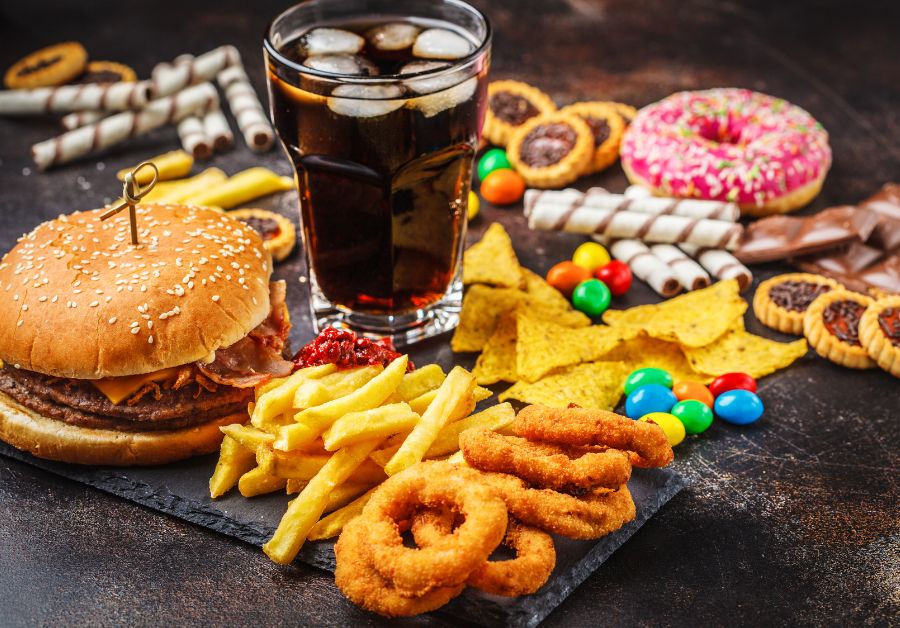In today’s busy world, ultra-processed foods (UPFs) have become a staple for many people due to their convenience. However, these foods often come with hidden health risks. Regular consumption has been linked to serious health conditions such as obesity, diabetes, heart disease, and even cancer. To make healthier choices, it’s essential to understand what ultra-processed foods are and how they impact your health.
What are Ultra-Processed Foods?

Ultra-processed foods, as defined by the NOVA classification system, are products made with few whole ingredients and loaded with artificial additives like preservatives, sweeteners, and colorings. In addition, they often contain high amounts of refined sugars, unhealthy fats, and sodium.
Examples of Ultra-Processed Foods:
- Sugary drinks: Sodas and energy drinks.
- Packaged snacks: Chips, cookies, and candy bars.
- Fast food: Burgers, fries, and chicken nuggets.
- Breakfast cereals: Pre-sweetened or flavored varieties.
- Processed meats: Bacon, sausages, and deli slices.
- Instant meals: Frozen pizzas, ready-made dinners, and instant noodles.
The Health Risks of Ultra-Processed Foods
While UPFs may seem convenient, they can negatively affect your health in several ways. Regular consumption has been linked to the following health risks:
- Cancer: The International Agency for Research on Cancer (IARC) reports a connection between UPFs and increased cancer risk due to harmful additives.
- Diabetes: Frequent UPF consumption has been associated with insulin resistance and type 2 diabetes.
- Heart Disease: High levels of sugar, trans fats, and sodium in UPFs contribute to cardiovascular issues and hypertension.
- Obesity: The energy-dense, nutrient-poor nature of UPFs often leads to overeating and weight gain.
Weight Gain and Obesity: A Growing Concern
One of the most alarming consequences of consuming ultra-processed foods is their contribution to weight gain. Research conducted by the IARC on nearly 350,000 adults found that participants who ate the most UPFs had a 15% greater risk of becoming overweight after five years compared to those who ate fewer UPFs.
Why does this happen? Foods like sugary cereals, chips, and candy bars are designed to be highly palatable but lack the fiber and protein that keep you full. For instance, eating a sugary cereal for breakfast might leave you hungry an hour later, increasing your chances of snacking on more processed foods throughout the day.
How to Reduce Ultra-Processed Foods in Your Diet
Fortunately, avoiding UPFs doesn’t have to be complicated. By making small changes to your eating habits, you can significantly reduce your intake of these unhealthy options.
- Focus on Whole Foods: Base your meals around minimally processed options like fruits, vegetables, whole grains, legumes, nuts, and seeds.
- Cook at Home: Preparing meals from scratch allows you to control what goes into your food. Start with easy recipes and fresh ingredients.
- Read Labels: Avoid products with long ingredient lists filled with artificial additives and refined sugars.
- Opt for Fresh or Frozen Produce: Choose fresh fruits and vegetables or minimally processed frozen options without added sauces or seasonings.
- Choose Natural Proteins: Replace processed meats like bacon or hot dogs with lean meats, fish, tofu, or legumes.
Keep in Mind
Although ultra-processed foods are convenient, their frequent consumption can harm your health. These products are strongly associated with chronic conditions like cancer, diabetes, heart disease, and obesity.
To protect your health, prioritize nutrient-dense, whole foods and limit your intake of UPFs. If you’re unsure where to start, our personalized nutrition counseling services can help. By adopting healthier eating habits, you can reduce your risk of chronic disease and improve your overall well-being.

